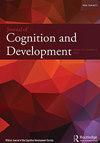从发展系统的角度协调执行功能技能的情境依赖性和领域通用性
IF 1.6
2区 心理学
Q3 PSYCHOLOGY, DEVELOPMENTAL
引用次数: 5
摘要
执行功能(Executive function, EF)技能是一组涉及有意的、目标导向行为的注意调节技能,包括(但不限于)工作记忆、认知灵活性和抑制控制等冷EF技能,以及有意重评价等热EF技能。这些技能不可避免地以目标和环境依赖的方式表达,导致一些人将环境教育技能视为对特定问题的特定适应,并加强了对使用更多生态环境评估的兴趣。了解英孚技能的情境依赖性有助于我们理解英孚技能是如何通过特殊经历发展起来的,以及它们如何促进关键的发展结果。然而,有充分的理由将EF技能视为相对通用的神经认知技能。使用标准化的直接行为评估来衡量,这些技能与定义良好但独特的神经网络可靠地联系在一起;它们预测了长期的发展结果;他们可以被训练成远距离迁移。我们认为,英语学习技能的发展系统模型可以调和英语学习技能是相对普遍的观点和强调这些技能的情境依赖性的观点。EF技能的生态适应性测量可以补充捕捉重要的年龄相关和个体差异的标准化测量,并应继续成为该主题研究的基石。我们相信这种类型的模型将有助于更深入地理解多重、同时和相互作用的因果影响,在许多分析层面(文化、社会、认知、神经和分子)上运作,共同产生有意识的控制。本文章由计算机程序翻译,如有差异,请以英文原文为准。
Reconciling the Context-Dependency and Domain-Generality of Executive Function Skills from a Developmental Systems Perspective
ABSTRACT Executive function (EF) skills are a set of attention-regulation skills involved in intentional, goal-directed behavior that include (but are not limited to) the cool EF skills of working memory, cognitive flexibility, and inhibitory control, and also the hot EF skill of intentional reevaluation. These skills are inevitably expressed in goal- and context-dependent ways, leading some to view EF skills as specific adaptations to particular problems and reinforcing interest in the use of more ecologically contextualized assessments. Appreciation of the context-dependency of EF skills adds to our understanding of how EF skills develop as a consequence of particular experiences and how they contribute to key developmental outcomes. There are good reasons, however, to view EF skills as relatively domain-general neurocognitive skills. Measured using standardized direct behavioral assessments, these skills are associated reliably with well-defined but distinct neural networks; they predict long-term developmental outcomes; and they can be trained in ways that produce far transfer. We argue that developmental systems models of EF skills can reconcile views of EF skills as relatively domain-general and views that emphasize the context-dependency of these skills. Ecologically adapted measures of EF skills can complement standardized measures that capture important age-related and individual differences and should remain a cornerstone of research on the topic. We believe this type of model will facilitate a deeper understanding of how multiple, simultaneous, and interacting causal influences, operating at many levels of analysis (cultural, social, cognitive, neural, and molecular), work together to produce conscious control.
求助全文
通过发布文献求助,成功后即可免费获取论文全文。
去求助
来源期刊

Journal of Cognition and Development
Multiple-
CiteScore
4.00
自引率
0.00%
发文量
29
期刊介绍:
The Journal of Cognition and Development is the official journal of the Cognitive Development Society (CDS). Some CDS members are concerned with basic research or theory; others focus on policy issues and practical applications. The range of interests includes cognitive development during all stages of life, and we seek to understand ontogenetic processes in both humans and nonhumans. Finally, their interests encompass typical as well as atypical development, and we attempt to characterize both biological and cultural influences on cognitive change and continuity.
 求助内容:
求助内容: 应助结果提醒方式:
应助结果提醒方式:


